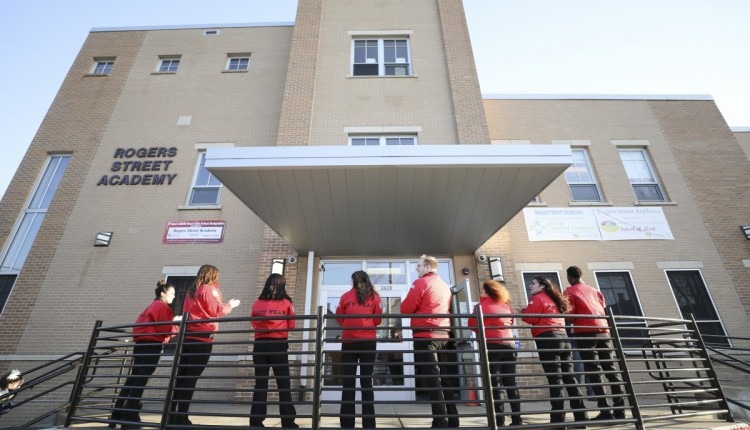Housing expert gives advice for City Year AmeriCorps members
An expert shares advice on housing during service
In 2013, Ofo Ezeugwu was an undergraduate student atTemple University. He served as vice president of the student body and dealt with a range of issues, everything from campus food to security—and most frequently campus housing. Ofo saw that students were moving off campus into the surrounding area and experiencing poor, sometimes illegal, treatment by landlords. As a student himself, Ofo understood the issues and decided he wanted to do something about it, so at age 23 he became an entrepreneur and started Whose Your Landlord (WYL).

Five years later, WYL is a growing online community of motivated—mostly millennial—renters. Users can post reviews of landlords, apartments and management companies. The site also offers many resources on tenant rights and how to find housing on a tight budget.
Knowing that affordable housing is an issue for our 3,000 AmeriCorps members who are serving in 350 public schools this year, we asked Ofo how young adults living on a modest stipend can successfully navigate the increasingly expensive renters market in the cities where we serve.
The interview has been edited for clarity and length.
Finding affordable housing on a budget
Q: Has finding housing become more difficult for young adults who are starting their professional lives and don’t have a lot of money?
A: Finding housing has definitely gotten systemically harder over the past decade. With cultural shifts in priorities, coupled with massive student loan debt, young people have shifted away from traditional homeownership and moved toward renting. As demand for rentals has increased, finding suitable housing has become more difficult. While the development of new apartment buildings has increased in cities across the U.S., these buildings tend to be market rate or luxury apartments—which isn’t much help for recent grads, people just starting out in their careers or those of us simply living on a budget.
Q: What resources are available to help young adults find housing solutions?
A: Well, WYL is a platform that helps through landlord reviews, housing literacy content and software built to help home providers better engage with the needs of their residents. While we don’t post any listings ourselves, we use peer generated information to disclose information, such as: what others have customarily paid for in rent, the length of their leases and the renter’s overall living experience We also have our Renter Commandments Handbook available on our site. It’s is a powerful guide towards understanding your housing rights, financial literacy and interpersonal engagement within your communities.
Q: What’s the best advice you could give to a City Year AmeriCorps member who needs to live in an expensive city on a modest stipend close to where they work?
A: Although it’s not necessarily the advice a young person wants to hear, the first thing we’d suggest is to live at home with relatives, if possible. If you’re serving in your hometown, this may be the perfect opportunity to save money—setting you up for success when you finally decide to move. If that is not an option or you are moving to another city for service, look for roommates and friends. It’s likely that there will be other City Year AmeriCorps members looking for roommates as well, so take advantage!
Make sure you’re in a neighborhood where you feel safe, reasonably close to public transit (or you have access to a bike), and that you invest in making decent relationships with your neighbors. Remember they’ve often lived there much longer than you have or ever will. Show respect, build relationships and be a part of the community.
Q: Most of our AmeriCorps members live with roommates to reduce costs. What are some factors young adults should consider when picking roommates?
A: There are two factors we consider most important. The first is that your roommate has a steady income and is committed to staying for the duration of your lease. You don’t want to end up in a situation where you’re getting heat from your landlord because you can’t make rent.
The second factor we suggest you consider is your roommate’s lifestyle. This is hugely important! If you know you’ll want peace and quiet after a long day of service, you might not enjoy a roommate who is constantly hosting parties and guests. Be sure to create norms that guide your home, have cleaning and buying schedules, and take time to get to know your roommate(s) so that serious conversations (should they arise) go smoothly. You don’t want to spend your service year feeling like you live with complete strangers!
Learn more about service with City Year:
Related stories
Yes, the holiday season can be stressful—making travel plans, wrapping up work before winter break, figuring out what gifts to...
Read more about Three reasons students may be thankful for their student success coachEvery year, thousands of young people decide to join AmeriCorps programs for a year (or more!) of service, helping to...
Read more about Everything you need to know about returning for another year as a City Year AmeriCorps memberCity Year is committed to providing our AmeriCorps members with resources, opportunities and support that help them to achieve their...
Read more about Empowering Futures: City Year Baton Rouge’s Partnership with Bottom LineFatimah Abdulmateen takes service seriously. Fatimah served two years with City Year as an AmeriCorps member, making her an alum...
Read more about A City Year alum with a passion for service—both here and abroad
















